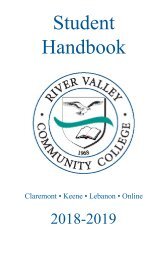You also want an ePaper? Increase the reach of your titles
YUMPU automatically turns print PDFs into web optimized ePapers that Google loves.
progress through the program; and to identify grading policies. All classes have a course<br />
syllabus, a separate document from the course outline, which further identifies course and<br />
classroom expectations of the individual instructor teaching the course.<br />
All program designs must meet the CCSNH Board of Trustees policies for degree<br />
requirements as outlined in BoT Academic Policy 620.02. All new programs must be<br />
approved through the Curriculum Team, the VPAAs, and the BoT.<br />
Budgeting for Programs<br />
All programs submit budgets each year to the Business Affairs Officer who is responsible<br />
for evaluation of programmatic budgets and fitting them into the college budget each year<br />
as described in Standard 7. Program Directors, in consultation with additional faculty in<br />
their programs, are responsible for identifying the financial needs of the academic program<br />
and for developing a budget that, while fiscally responsible, will also meet the needs of<br />
program improvement. Many programs, with the exception of liberal arts, general studies,<br />
and biological science, are further financially eligible for Perkins Grant funding under the<br />
classifications as outlined by the State of NH Department of Education.<br />
Assuring Academic Quality<br />
Programmatic Oversight, Implementation, and Review<br />
As shown in the organizational structure (p. x), each program has a Program Director who<br />
is responsible for oversight of all aspects of the program including faculty, budgets, mode<br />
of program offering, and curriculum. All Program Directors are further supported by the<br />
Department Chair who provides an additional layer of oversight for the integrity and<br />
quality of academic programs. While the direct oversight of the curriculum is the<br />
responsibility of the Program Director, any curricular changes that a Program Director<br />
wishes to implement must be approved through the process outlined in Figure 4.1. Final<br />
approval for programmatic changes is the responsibility of the VPAA.<br />
Many programs at <strong>RVCC</strong>, particularly those in the allied health, health science, and<br />
nursing, have additional oversight reporting through their national accreditation agencies.<br />
Many programs also have individual advisory boards who assist with oversight of the<br />
program and work specifically to ensure that programs are relevant to the community and<br />
industry in which graduates will be employed.<br />
Figure 4.1: Programmatic changes approval process<br />
39 | P a g e





